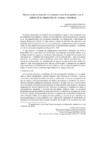Hacia un nuevo modelo de comunicación lexicográfica en el ámbito de la adquisición de lenguas extranjeras

View/
Use this link to cite
http://hdl.handle.net/2183/22538
Except where otherwise noted, this item's license is described as Atribución-CompartirIgual 3.0 España
Collections
Metadata
Show full item recordTitle
Hacia un nuevo modelo de comunicación lexicográfica en el ámbito de la adquisición de lenguas extranjerasAlternative Title(s)
Towards a new model of lexicographical communication in the field of SLAAuthor(s)
Date
2017Citation
Revista de lexicografía, 2017, 23: 67-84. ISSN: 1134-4539
Abstract
[Resumen] Las consideraciones expuestas en este artículo tienen como objetivo ampliar la discusión en torno a la adquisición del lenguaje sobre los fundamentos de la teoría de la comunicación. Sobre esta base, se propone una integración del modelo de comunicación de Luhmann en el marco teórico de la lexicografía aplicada al aprendizaje de lenguas (diccionarios monolingües). La relevancia de este modelo diferencialista de la comunicación reside en la conceptualización de la gramática en cuanto código emergente; en este sentido, se argumentará que, desde este punto de vista cognitivo, la estructura lexicográfica que sostienen el acto de comunicación ostenta la capacidad, en virtud de sus propiedades mediales, de revelar este código gramatical y activar de manera implícita la adquisición de la gramática en el usuario del diccionario. [Abstract] The considerations laid out in this article aim to broaden the discussion concerning language acquisition on the foundations of the theory of communication. On that basis, this contribution proposes an integration of Luhmann’s model of communication in the theoretical framework of SLA-Lexicography (monolingual learner dictionaries). The relevance of this differentialist model lies in its ability to conceptualize grammar as an emergent code. In this regard, it will be argued that, from a cognitive point of view, the lexicographic structure supporting this act of communication may be capable, by virtue of its medial properties, of revealing this grammatical code and implicitly activating grammar acquisition in the dictionary user’s perception.
Keywords
Comunicación lexicográfica
Luhmann
Lógica diferencial
Modelo de comunicación
Código gramatical
Adquisición del lenguaje
Lexicographical communication
Differentialist logic
Communication model
Grammatical code
Language acquisition
Luhmann
Lógica diferencial
Modelo de comunicación
Código gramatical
Adquisición del lenguaje
Lexicographical communication
Differentialist logic
Communication model
Grammatical code
Language acquisition
Rights
Atribución-CompartirIgual 3.0 España
ISSN
1134-4539






